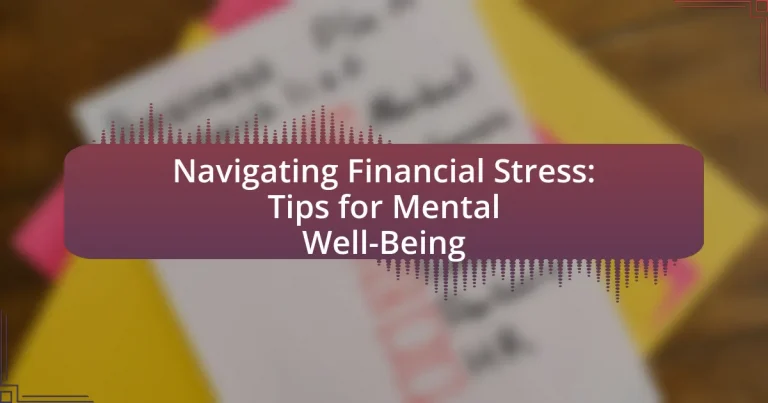Financial stress refers to the anxiety and worry stemming from financial difficulties, such as debt, insufficient income, or unexpected expenses, and it can significantly impact mental well-being, leading to issues like depression and anxiety. Common causes include job loss, high debt levels, and inadequate savings, with unexpected expenses being a major contributor to financial strain. This article explores the psychological symptoms of financial stress, its effects on physical health, and practical strategies for managing it, including budgeting, seeking professional help, and practicing mindfulness. Additionally, it highlights the importance of social support and lifestyle changes in enhancing mental resilience during financially challenging times.

What is Financial Stress and How Does it Affect Mental Well-Being?
Financial stress is the anxiety and worry that arises from financial difficulties, such as debt, insufficient income, or unexpected expenses. This type of stress can significantly impact mental well-being, leading to issues such as depression, anxiety, and decreased overall life satisfaction. Research indicates that individuals experiencing financial stress are more likely to report mental health problems; for instance, a study published in the Journal of Health and Social Behavior found that financial strain is associated with higher levels of psychological distress. Thus, financial stress not only affects an individual’s financial situation but also has profound implications for their mental health.
What are the common causes of financial stress?
Common causes of financial stress include job loss, high debt levels, unexpected expenses, and inadequate savings. Job loss can lead to immediate financial instability, as individuals struggle to meet their obligations without a steady income. High debt levels, particularly from credit cards or loans, create ongoing financial pressure due to interest payments and the need for repayment. Unexpected expenses, such as medical emergencies or car repairs, can disrupt budgets and lead to financial strain. Lastly, inadequate savings for emergencies or retirement can exacerbate anxiety about future financial security, as studies show that individuals with limited savings report higher levels of stress related to their financial situation.
How do unexpected expenses contribute to financial stress?
Unexpected expenses significantly contribute to financial stress by disrupting planned budgets and creating immediate financial burdens. When individuals encounter unforeseen costs, such as medical bills or car repairs, they often lack the savings to cover these expenses, leading to anxiety and worry about their financial stability. According to a survey by the American Psychological Association, 72% of Americans reported feeling stressed about money at some point, with unexpected expenses being a primary factor. This stress can result in negative mental health outcomes, including anxiety and depression, as individuals struggle to manage their financial obligations.
What role does job insecurity play in financial stress?
Job insecurity significantly contributes to financial stress by creating uncertainty about future income and employment stability. Individuals facing job insecurity often experience anxiety regarding their ability to meet financial obligations, which can lead to increased stress levels. Research indicates that 70% of employees report feeling stressed about job security, and this stress can negatively impact mental health, leading to issues such as depression and anxiety disorders. Furthermore, financial stress stemming from job insecurity can result in poor decision-making regarding spending and saving, exacerbating the overall financial situation.
How can financial stress manifest in mental health issues?
Financial stress can manifest in mental health issues such as anxiety, depression, and increased emotional distress. Research indicates that individuals experiencing financial difficulties often report higher levels of psychological distress, with studies showing that 72% of adults cite money as a significant source of stress, leading to symptoms like insomnia, irritability, and difficulty concentrating. Furthermore, financial stress can exacerbate pre-existing mental health conditions, creating a cycle of worsening mental health and financial instability.
What are the psychological symptoms of financial stress?
The psychological symptoms of financial stress include anxiety, depression, irritability, and difficulty concentrating. These symptoms arise as individuals face overwhelming financial pressures, leading to heightened emotional distress. Research indicates that financial stress can trigger anxiety disorders, with studies showing that 72% of Americans report feeling stressed about money, which correlates with increased rates of depression and irritability. Additionally, financial stress can impair cognitive functions, making it challenging for individuals to focus on daily tasks.
How does financial stress impact physical health?
Financial stress negatively impacts physical health by increasing the risk of chronic conditions such as hypertension, heart disease, and weakened immune function. Research indicates that individuals experiencing financial strain often exhibit higher levels of stress hormones, which can lead to inflammation and other health issues. A study published in the Journal of Health and Social Behavior found that financial stress correlates with poorer health outcomes, including increased rates of anxiety and depression, which further exacerbate physical health problems.

What Strategies Can Help Navigate Financial Stress?
To navigate financial stress effectively, individuals should adopt strategies such as creating a budget, seeking professional financial advice, and practicing mindfulness techniques. Creating a budget allows individuals to track income and expenses, helping to identify areas for savings and reducing anxiety about financial uncertainty. Seeking professional financial advice can provide tailored strategies and insights, which can lead to better financial decision-making and reduced stress. Mindfulness techniques, such as meditation and deep-breathing exercises, can help manage anxiety and improve mental well-being during financially stressful times. Research indicates that individuals who engage in mindfulness practices report lower levels of stress and improved emotional regulation, supporting the effectiveness of these strategies in managing financial stress.
How can budgeting alleviate financial stress?
Budgeting alleviates financial stress by providing a clear framework for managing income and expenses. This structured approach enables individuals to prioritize spending, track financial goals, and identify areas for savings. Research indicates that individuals who budget report lower levels of financial anxiety, as they feel more in control of their financial situation. A study published in the Journal of Financial Planning found that 70% of participants who adhered to a budget experienced reduced stress levels related to their finances. By establishing a budget, individuals can create a sense of security and predictability, which directly contributes to improved mental well-being.
What are effective budgeting techniques to consider?
Effective budgeting techniques include the zero-based budgeting method, the 50/30/20 rule, and the envelope system. Zero-based budgeting requires allocating every dollar of income to expenses, savings, or debt repayment, ensuring that income minus expenses equals zero. This method promotes awareness of spending habits and encourages prioritization of essential expenses. The 50/30/20 rule divides income into three categories: 50% for needs, 30% for wants, and 20% for savings and debt repayment, providing a balanced approach to managing finances. The envelope system involves using cash for specific spending categories, helping individuals stick to their budget by limiting overspending. These techniques are effective as they provide structured frameworks for managing finances, reducing financial stress, and promoting mental well-being.
How can tracking expenses improve financial awareness?
Tracking expenses enhances financial awareness by providing individuals with a clear view of their spending habits. This visibility allows people to identify patterns, prioritize needs over wants, and make informed decisions about budgeting. Research indicates that individuals who track their expenses are more likely to save money and reduce unnecessary expenditures, leading to improved financial stability. A study by the National Endowment for Financial Education found that 70% of people who track their spending report feeling more in control of their finances, which directly correlates with reduced financial stress.
What role does seeking professional help play in managing financial stress?
Seeking professional help plays a crucial role in managing financial stress by providing individuals with expert guidance and tailored strategies to address their specific financial challenges. Financial professionals, such as financial advisors or counselors, can help clients develop effective budgeting techniques, create debt repayment plans, and improve overall financial literacy. Research indicates that individuals who seek professional financial advice report lower levels of financial anxiety and greater confidence in their financial decision-making. For instance, a study published in the Journal of Financial Planning found that clients who engaged with financial planners experienced a significant reduction in stress related to financial matters, highlighting the positive impact of professional assistance on mental well-being.
How can financial advisors assist in reducing stress?
Financial advisors assist in reducing stress by providing expert guidance on financial planning and management. They help clients create personalized budgets, set realistic financial goals, and develop investment strategies that align with their risk tolerance and future aspirations. This structured approach alleviates uncertainty and empowers clients to make informed decisions, which can significantly lower anxiety related to financial matters. Research indicates that individuals who engage with financial advisors report higher levels of financial confidence and lower stress levels, as they feel more in control of their financial situations.
What mental health professionals can help with stress management?
Mental health professionals who can help with stress management include psychologists, licensed clinical social workers, and licensed professional counselors. Psychologists utilize therapeutic techniques such as cognitive-behavioral therapy to address stress-related issues, while licensed clinical social workers provide support and resources to help individuals cope with stressors. Licensed professional counselors offer counseling services that focus on stress management strategies. Research indicates that therapy can significantly reduce stress levels, with studies showing that cognitive-behavioral therapy can lead to a 50% reduction in stress symptoms for many individuals.

What Practical Tips Can Enhance Mental Well-Being During Financial Stress?
Practical tips to enhance mental well-being during financial stress include creating a budget, practicing mindfulness, seeking social support, and engaging in physical activity. Establishing a budget helps individuals gain control over their finances, reducing anxiety associated with uncertainty. Mindfulness practices, such as meditation, have been shown to decrease stress levels and improve emotional regulation. Social support from friends and family can provide emotional relief and practical advice, which is crucial during challenging financial times. Additionally, regular physical activity releases endorphins, which can improve mood and reduce feelings of stress. These strategies are supported by research indicating that structured financial planning and social connections significantly contribute to improved mental health outcomes during periods of financial strain.
How can mindfulness practices reduce financial stress?
Mindfulness practices can reduce financial stress by promoting emotional regulation and enhancing awareness of financial behaviors. These practices, such as meditation and deep breathing, help individuals manage anxiety and cultivate a more balanced perspective on their financial situations. Research indicates that mindfulness can lead to improved decision-making and reduced impulsivity, which are critical in managing finances effectively. A study published in the Journal of Financial Therapy found that participants who engaged in mindfulness techniques reported lower levels of financial anxiety and greater financial well-being. This evidence supports the assertion that mindfulness practices can significantly alleviate the stress associated with financial challenges.
What mindfulness techniques are effective for stress relief?
Mindfulness techniques effective for stress relief include deep breathing exercises, body scans, and mindful meditation. Deep breathing exercises help activate the body’s relaxation response, reducing stress hormones and promoting a sense of calm. Body scans involve focusing attention on different parts of the body, which can enhance awareness and release tension. Mindful meditation encourages individuals to observe their thoughts and feelings without judgment, fostering emotional regulation and resilience. Research published in the Journal of Health Psychology indicates that these techniques can significantly lower perceived stress levels and improve overall mental well-being.
How does meditation contribute to better mental health?
Meditation contributes to better mental health by reducing stress, anxiety, and depression while enhancing emotional well-being. Research indicates that regular meditation practice can lower cortisol levels, the hormone associated with stress, leading to improved mood and resilience. A study published in JAMA Internal Medicine found that mindfulness meditation programs significantly improved anxiety, depression, and pain, demonstrating the effectiveness of meditation in promoting mental health.
What lifestyle changes can support mental well-being amidst financial challenges?
Engaging in regular physical activity, maintaining a balanced diet, and practicing mindfulness can significantly support mental well-being amidst financial challenges. Research indicates that physical exercise releases endorphins, which improve mood and reduce stress levels. A balanced diet rich in nutrients can enhance brain function and emotional stability, while mindfulness practices, such as meditation, have been shown to decrease anxiety and improve overall mental health. According to a study published in the Journal of Health Psychology, individuals who incorporate these lifestyle changes report lower levels of stress and better coping mechanisms during financial difficulties.
How can physical activity improve mental resilience during financial stress?
Physical activity can significantly enhance mental resilience during financial stress by reducing anxiety and improving mood. Engaging in regular exercise releases endorphins, which are chemicals in the brain that act as natural painkillers and mood elevators. Research published in the Journal of Clinical Psychiatry indicates that physical activity can lower symptoms of anxiety and depression, which are often exacerbated by financial difficulties. Furthermore, a study from the American Psychological Association found that individuals who exercise regularly report higher levels of self-esteem and better coping strategies, enabling them to manage stress more effectively. Thus, incorporating physical activity into daily routines can serve as a powerful tool for building mental resilience in the face of financial challenges.
What role does social support play in coping with financial stress?
Social support plays a crucial role in coping with financial stress by providing emotional, informational, and practical assistance. Individuals who receive social support are more likely to experience lower levels of anxiety and depression related to financial difficulties, as evidenced by research indicating that strong social networks can buffer the negative effects of stressors. For instance, a study published in the Journal of Health and Social Behavior found that individuals with supportive relationships reported better mental health outcomes during financial hardships, highlighting the importance of community and interpersonal connections in managing stress.





